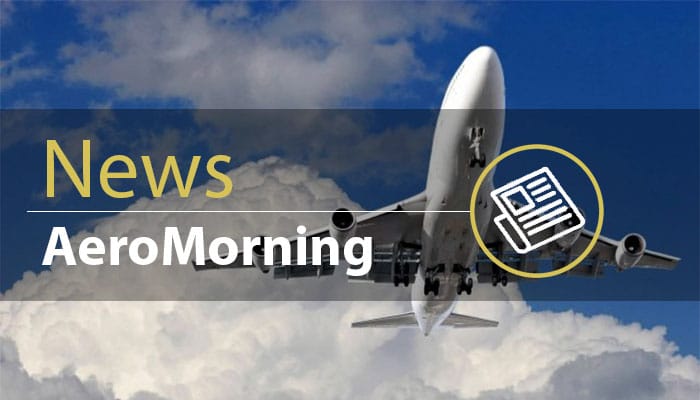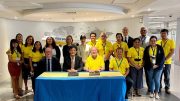More than 140 students join Iberia Maintenance for their vocational-technical internships, 50% more than the previous course

- The students come from up to 10 training cycles from different centres offering intermediate and higher education degrees, professional certificates and EASA 147 basic training centres.
- The internships last between three and nine months, the longest being those corresponding to the Intensive Dual mode cycles, to which 46 students belong.
- Since 2018, more than 400 students have participated in the Spanish company’s internship programmes, of which Iberia Maintenance has hired more than 60%.
- ‘Vocational training is a very effective way to integrate into the labour market, backed by a growing demand for highly qualified professionals,’ explains Ignacio de la Iglesia, Manager of the Iberia Maintenance Training Centre.
- This year, the Iberia Maintenance Training Centre celebrated its 20th anniversary as an EASA 147 centre.
Iberia Maintenance welcomes 144 vocational-technical students who will carry out their internships at La Muñoza, where the company’s facilities are located, during the 2024/25 academic year. This is a record number of students and represents an increase of more than 50% on the number registered in the previous academic year. Of these, 46 come from the Intensive Dual Vocational Training, a modality in which the number of students enrolled increases year after year.
The students who join Iberia Maintenance can come with intermediate or higher degrees, as well as professional certificates and basic training centres courses approved by AESA. The main collaborating centres are CIFP Profesor Raúl Vázquez, IES Barajas, CFELYA Leganés and Aviation Group. The specialities they come from are Aeromechanics, Avionics, Assembly of Structures, Composite Materials, Aeronautical Painting, Machining, Aeronautical Verification and Electromechanics, as well as basic training 147 B1.1 and B2.

Since 2018, more than 400 students have completed internships at Iberia Maintenance, of which nearly 250 have been hired by the airline, resulting in a hiring ratio of more than 60%.
‘Vocational-technical training is a very effective means of labour integration, supported by a growing demand for highly qualified professionals, especially in certain sectors, such as aeronautics,’ explains Ignacio de la Iglesia, Manager of the Iberia Maintenance Training Centre. ‘The collaboration between training centres, the public sector and companies make it possible to adjust the educational programmes to the needs of the market, facilitating the rapid integration of students into the workplace,’ says de la Iglesia.
80% of the profiles in demand in the aeronautical maintenance sector correspond to vocational-technical training
Currently, Iberia Maintenance employs more than 2,500 Aircraft Maintenance Technicians (AMT) in the different production areas. This year 2024 alone, more than 200 AMTs have joined the company. The relevance of AMTs will be even more prominent in the future, given that the world fleet is expected to experience a 28% increase in the next 10 years, which will lead to an increase in demand of around 33,000 new AMTs per year globally.

‘At Iberia Maintenance, AMTs are the backbone of our operations and makeup 80% of our workforce; their work is crucial to ensure the safety of every flight. One of the main ways to access this profession is through vocational-technical training. In Spain, only around 34% of students opt for this training route and, to a lesser extent, the vehicle maintenance family, which includes degrees in aeromechanics, avionics and structural assembly,’ says de la Iglesia. ‘Currently, there is a strong growth in the MRO sector with an unprecedented generational changeover. For the Spanish aeronautical sector to be competitive, the key will be to have qualified staff, for which it is necessary for the number of people enrolled in the relevant vocational training cycles to increase’, he concludes.
+150,000 hours of training per year
This year, the Iberia Maintenance Training Centre celebrated its 20th anniversary as an EASA 147 centre, approved by the Spanish Aviation Safety Agency (AESA). This qualification allows it to provide type training to those professionals with an Aircraft Maintenance Licence in the categories of Mechanics (B1.1) or Avionics (B2) and to include new type ratings (fleet-engine) in the licence. This step is required to subsequently be authorised as an aircraft certifier, which is essential for putting an aircraft into service after the work is carried out within the scope of that category.
Iberia Maintenance is an authorised training centre to provide training in the Airbus A320, A330 and A350 families, being the only one in Spain approved to provide training in the A320 and A350 families.
Since the approval in 2004, more than 10,000 students have been trained at the Iberia centre. The Training Centre currently has 16 instructors with this approval.
In addition, the Iberia Maintenance Training Centre provides and coordinates technical training in the different maintenance business areas, such us engines, aircraft and components, and offers these services to external customers. More than 50 instructors, support staff and content developers work in these areas. In 2023, more than 150,000 hours of training were delivered in the different modalities. Source: IBERIA








